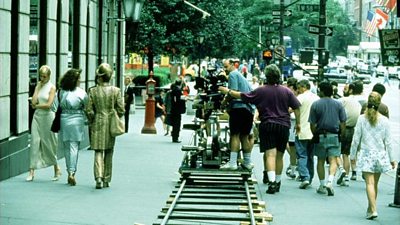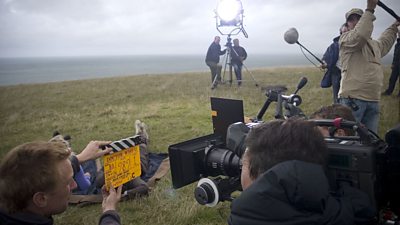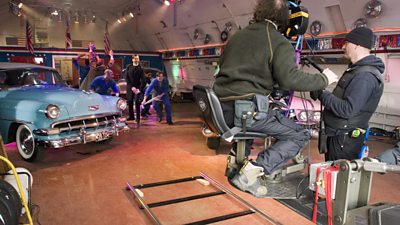‘Freelancer’ in this Guideline is taken to mean anyone who, in a personal capacity, provides a service to the Â鶹ԼÅÄ as a temporary worker i.e. on a short- or fixed-term contract. Freelancers can cover a wide range of jobs, including Producers, Directors, Presenters, cameramen, musicians, etc.
Whilst they are self-employed for tax purposes, unlike ‘contractors’ (see our Guideline in Related Topics) or Independent Production Companies (see our Guideline in Related Topics), when working on Â鶹ԼÅÄ productions, most should be considered the same as Â鶹ԼÅÄ staff for health and safety purposes.
However, variations to this do occur, for example, where the freelancer is responsible for scheduling and controlling their own work, or they work for a service company, or they undertake any of the specialist roles listed in the standard Â鶹ԼÅÄ freelance contract terms (see Recommended Links) - in which case the ‘duty of care’ owed by the Â鶹ԼÅÄ to such individuals is likely to be somewhat reduced. Where needed, clarification should be sought through contract agreements.
Whilst we refer to freelancers throughout this Guideline in relation to them working for a production team (which will be the great majority of those engaged), the guidance given applies equally to freelancers working in non-production areas.
For more information, see "Health and Safety Facts for Freelancers" (Useful Documents).
What can go wrong?
- Lack of communication and co-ordination, especially if they come late to the production
- Lack of awareness of safety risks or of safety-related processes / requirements, especially if they come late to the production
- Working long hours leading to physical fatigue
- Working prolonged periods without a break in jobs, leading to cumulative fatigue and possible ill-health
- Stress / anxiety over job situations, feeling isolated.
Legal / Â鶹ԼÅÄ Requirements
For freelancers working under our direction as part of a production team, we accept the same duties of care to them as we owe our own employees, namely:
- that all significant safety risks arising out of our business are being suitably assessed and managed in order to provide a safe place of work
- communicate clearly what it is that we want from them and co-ordinate their activities with our own
- establish that they are competent and capable of doing the work safely – provide training where necessary
- monitor and manage their work to check they are working to our safe systems of work and in compliance with Â鶹ԼÅÄ Safety Guidelines.
In return, freelancers have general duties and responsibilities for their own safety, and the safety of others who may be affected by what they do, as well as any further duties and responsibilities which stem from the job role they are engaged to perform.
Any variations to this are described in the sections which follow.
Controls
For the most part, freelancers should simply ‘fit in’ as an employee of the Â鶹ԼÅÄ, observing the requirements of our Safety Guidelines and complying with our procedures and processes as they relate to the job role they perform. There are however, a few areas of safety control that perhaps need some clarification and which staff and freelancers alike should be aware of:
Competence / training
In general, Â鶹ԼÅÄ training courses are not available to those on short- or fixed-term contracts. As freelancers, they are expected to arrange for and pay for themselves any training and up-skilling they need to be able to perform the job required of them competently. The exceptions to this can be where the Â鶹ԼÅÄ Academy designates the training course as either ‘orientation training’ (i.e. required to understand Â鶹ԼÅÄ-specific processes and systems) or ‘mandatory training’ (which includes some safety training). Linked to ‘Scheduling’ below, there can be problems with freelancers accessing these courses, especially if they come late to the production. This can present safety issues if those courses need to be completed prior to work on location, particularly where the freelancer holds a position of responsibility for the safety of others.
- When engaging freelancers, productions must check they are competent to do the work required of them, including with regard to assessing and managing the safety risks they will be responsible for. Production Safety Passport (PSP) training courses (see Recommended Links) are accepted across the TV /Radio production industry and, providing they will remain ‘in-date’ throughout the production run, will not need to be repeated during their contracted period with us. Freelancers can assist this process by informing hiring managers of their PSP records on their Screenskills Community Profile (see Recommended Links)
- Where the freelancer is required by the Â鶹ԼÅÄ to undergo specific safety training for the job, their engagement with the Â鶹ԼÅÄ should build this training into their schedule of work and, if required for safety / insurance purposes, this should be completed prior to the work commencing on location. The freelancer’s time for this training is only to be considered paid ‘working time’ if they complete it during an existing contract period – freelancers should not be brought in and paid to attend such training out of contract
- Freelancers should co-operate with the production to undergo the mandatory training required of them by the Â鶹ԼÅÄ â€“ noting that PSP face-to-face courses are scheduled by training providers (including the Â鶹ԼÅÄ) for the benefit of all and are generally not available ‘on demand’. Online training courses do not provide an adequate substitute for PSP courses. Any issues in this regard should be referred to local Managers, Â鶹ԼÅÄ Safety and the Â鶹ԼÅÄ Academy.
For more information, see our Guideline on 'Training and Competence: Safety' in Related Topics.
Scheduling
Long working hours are not unknown in TV / Radio productions (see our Guideline on Tiredness and Fatigue in Related Topics) and these present some particular safety issues for freelancers. It is well known that freelancers can be reluctant to turn down work for fear of its potential negative impact on gaining future engagements. This can result in them doing ‘back to back’ shoots, often multiple ones. Some of these shoots may be physically and/or mentally demanding. The freelancer can therefore come to a production shoot already fatigued, or perhaps even unwell, and the production team simply won’t know this, relying on them to turn down the work if they don’t feel fit enough to do it. And once on location, the pressure to provide a good service can result in the freelancer being willing to work long hours, potentially compounding possible safety risks if they are already fatigued.
The following steps should be taken for the benefit of all:
- Demands placed on freelancers should be no different to that asked of staff i.e. ‘reasonable’ and in compliance with Â鶹ԼÅÄ Safety Guidelines. Those managing freelancers should encourage them to speak up if at any time they feel that the demands placed on them are ‘unreasonable’, without fear of sanction
- Some shoots can be anticipated to be more physically or mentally demanding than others (e.g. adventure activity shoots, working in harsh environments, etc.). It is important that any freelancers engaged on these are given sufficient notice to enable them to prepare adequately, including building into their schedule prior rest or conditioning periods
- For particularly demanding shoots, productions should try to front-load the schedule with the least demanding work, allowing for a period of ‘acclimatisation’ in preparation for the demands to come; where this isn’t practical, productions should seek assurances from freelancers that they will be able to co-ordinate their workload in the run-up to the job so as to arrive fit and able to deliver against the schedule whilst enabling the production to meet the Â鶹ԼÅÄ’s own HR Agreement for working time
- Whilst last minute engagements of freelancers is sometimes inevitable (e.g. to fill a last minute cancellation), it should not be a commonplace occurrence
- Producers and others on location should monitor the health and well-being of freelancers (and others) to minimise the risk of accidents through fatigue or illness. Those performing particularly demanding roles (e.g. camerawork, presenting) should not be required to perform hazardous activities when fatigued or unwell (e.g. long drives at end of working day)
- Freelancers must monitor their own health and well-being and speak-up if they feel fatigued or otherwise impaired in such a way as to present an undue risk of accidents or ill-health.
Personal protective equipment (PPE)
The need for PPE to protect persons from health and safety risks at work is defined in safety law, in Â鶹ԼÅÄ Safety Guidelines and/or in production risk assessments. Under safety law, employers are required to provide employees with PPE where the need arises, and at no cost to the employee. This requirement applies equally to freelancers, though there are a few notable exceptions.
- In general, as employers, productions should provide PPE to those freelancers whom they contract directly, and Service Companies should provide PPE to those it contracts. This duty extends to those PPE items which are routinely required in workplaces, for example, hard hats, safety shoes, high viz vests, basic hearing and eye protection, etc.
- Where the production insists on the use of PPE which is specialised / specific to a given location or job (due to risk assessment findings or local safety rules), then the production would be expected to provide and meet the costs of these, including for those freelancers provided by a Service Company. Such equipment could include, for example, cold weather gear for work in extreme environments, life-jackets when working on water, etc. At the discretion of the production, suitable equipment may be bought, hired, loaned or provided by an expert third party
- Variations or exceptions to the above arise, for example, where the PPE equipment can be considered an inherent part of the job role to be performed. For example, a freelance rigger would be expected to come with their own work at height harness and fall arrest lanyard as its use is an integral part of their job; similarly, a gaffer would be expected to have their own insulating gloves and tools to be able to perform electrical testing safely – they simply couldn’t do their jobs without it. Not only would the freelancers in these situations be better able to select and maintain this equipment themselves, they can also re-coup the cost of it over a number of jobs.
Health Surveillance
Where the law / Â鶹ԼÅÄ Safety Guidelines require it, freelancers exposed to specific health risks must be subject to appropriate health surveillance, with records kept. One such health risk is that from Noise where, for example, freelance musicians are required to have health surveillance to help protect them against the risk of noise induced hearing loss arising from the sound of their own, and other musicians, instruments (see our Noise at Work Guideline in Related Topics).
- Freelancers who regularly work with the same Â鶹ԼÅÄ Performing Group should be included in the regular health surveillance arranged for and undertaken by that Group, with appropriate actions taken to minimise risk of injury
- Freelance musicians who do not perform regularly for the same Performing Group may need to arrange and be able to demonstrate their own noise health surveillance arrangements. Managers who engage them should satisfy themselves that they are subject to an appropriate hearing protection scheme (including regular audiometry) and that no part of their performance will put them at undue risk of further harm.
Insurance
Freelancers who are a member of a team and simply follow or take instruction by more senior persons within the Â鶹ԼÅÄ are not contractually required to have their own liability insurance. If however, their role requires them to manage their own activities (e.g. a freelance rigger or special effects provider), they will be required to hold an appropriate level of public liability insurance (and products liability insurance if providing safety or other equipment to be used by the Â鶹ԼÅÄ), and the level of cover required will depend on the risks the role presents to others. Insurance requirements will be set out in the freelancer’s contract and further details of the roles which routinely involve specific insurance requirements are listed in the insurance section of the Â鶹ԼÅÄ Worker Contract (see Recommended Links). Further details of the Â鶹ԼÅÄ schemes that apply to freelancers (and important eligibility criteria for those contracted through a service company, can be found in 'Insurance for Freelancers' (see Recommended Links). Freelancers contracted to contractors engaged by the Â鶹ԼÅÄ are not entitled to Â鶹ԼÅÄ freelance schemes.
- Productions should clarify the insurance situation with any freelancers they engage prior to them working for the Â鶹ԼÅÄ.
- Freelancers who are required to hold public, products or professional liability insurance cover should ensure that they have appropriate levels of cover, that the cover is valid for the role they will be performing and that it applies throughout the period they will be working for the Â鶹ԼÅÄ.
- Freelancers who are required to hold liability insurance cover and who will be providing their service to the Â鶹ԼÅÄ outside the country they live in should ensure that their cover is valid for any legal proceedings which might be taken outside the country they live in.
The production may obtain further advice from Â鶹ԼÅÄ Insurance.
Useful documents
Recommended links
-
[Gateway]
-
[Gateway]
-
-
Introducing you to the world of freelancing
-
How to take care of yourself and learning when to say 'no' to work
-
THE safety training courses for TV and Radio production roles
-
Finding a course and a training provider
-
-
-
-
Working with Third Parties topics
-

Contractors: Working with
This Guideline sets out our approach to working safely with contractors and includes access to our vetted contractor lists. -

Contributors: Working with
This Safety Guideline provides guidance to those who work with contributors in the generation of content for our programmes or webpages, be it us filming / recording them or them providing us with their user generated content (UGC). -

Freelancers: Working with
A Safety Guideline to the engagement and management of ‘freelancers’ working at the Â鶹ԼÅÄ. -

Independent Production Companies: Working with
The Â鶹ԼÅÄ needs to ensure that any Independent Production Company it commissions is able and competent to make the programme with due consideration for health and safety. -

Monitoring and Review
Monitoring and review are the ‘check’ part of the Plan–Do–Check–Act of our H&S management system. -

Riggers: Selection of
This Safety Guideline provides guidance to those who wish to engage riggers / rigging supervisors on productions. -

Working with Third Parties
This section lists the safety guidelines we have for when we work with third parties i.e. those who are not employed directly by the Â鶹ԼÅÄ.
More from SSR
-
Your platform to record accidents, risk assessments, assurance monitoring and inspections
-
Safety Equipment Stores
Just one number to call: 020 3614 5155 -
Â鶹ԼÅÄ Safety Guidelines
An A-Z of Â鶹ԼÅÄ's Health and Safety Guidelines -
Safety Advice Line: 0370 411 0464 Email: safety@bbc.co.uk
- A-Z of Â鶹ԼÅÄ Safety Guidelines
- Accident Reporting and Investigation
- Â鶹ԼÅÄ Health & Safety Policy
- Contractors (incl. vetted lists)
- Contributors
- Fire Safety
- Freelancers
- Independent Production Companies
- Risk Assessment
- Safety Alerts
- Safety Responsibilities
- Safety Training
- Sets & Premises Safety Guide
Events guidance - key links:
- Exhibitions
- General Guidance
- Indoor Location Recce Checklist
- Outdoor Location Recce Checklist
- Major Incidents & Emergency Planning
- Marketing and Promotional
- Noise Exposure
- Planning and Management
- Responsibilities
- Responsibilities Form
- Laser Lighting Effects
- Strobe Lighting
- Temporary Stages and Rostra
Health topics - key links:
- (Â鶹ԼÅÄ network only)
- Contributors Fitness to Participate
- Display Screen Equipment (DSE)
- (Â鶹ԼÅÄ network only)
- First Aid and Welfare on Location
- International Travel - Risks & Health
- Manual Handling
- Mental Health: Â鶹ԼÅÄpage
- (Â鶹ԼÅÄ network only)
- Personal Health and Wellbeing
- Pregnancy
- Psychological Trauma Support & Trauma Risk Management (TRiM)
- Tiredness and Fatigue
- Travel Health Contacts
Â鶹ԼÅÄ High Risk - key links:
- CBRN and Industrial Spills
- Covert Filming
- Crisis Management and Security Support
- Demonstrations, Protests and Crowds
- Disaster Coverage
- Door Stepping
- (Â鶹ԼÅÄ network only)
- (Â鶹ԼÅÄ network only)
- Public Order
- Safety Equipment Stores
Â鶹ԼÅÄ Journalism - key links:
Â鶹ԼÅÄ Productions - key links:
- Aerial Filming and Airfields
- Animals: Displaying and handling for performance
- Boats: Working on
- Children and Young People
- Driving
- Electrical Equipment and Systems
- First Aid and Welfare on Location
- Food Safety (Cooking and Catering)
- Remote Location Working
- Roads and Streets: Working by
- Security of Productions on Location
- Stunts
- Tiredness and Fatigue
- Unmanned Aerial Systems (UAS aka Drones)
- Vehicles: Recording in, from and around
- Working at Height: Mobile Elevating Work Platforms
- Working at Height: Tower Scaffolds
Â鶹ԼÅÄ Radio - key links:
- (Â鶹ԼÅÄ Network only)
Â鶹ԼÅÄ Security - key links:
Â鶹ԼÅÄ Sport - key links:
About this site
This site describes what the Â鶹ԼÅÄ does in relation to managing its health, safety and security risks and is intended for those who work directly for the Â鶹ԼÅÄ.
It is not intended to provide instruction or guidance on how third parties should manage their risks. The Â鶹ԼÅÄ cannot be held liable for how this information is interpreted or used by third parties, nor provide any assurance that adopting it would provide any measure of legal compliance. More information
Some links on this site are only accessible when connected to the Â鶹ԼÅÄ network
